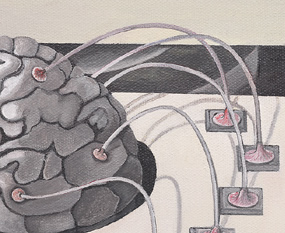Mar 3 2005
 A research group led by Academy Professor Mikko Sams is developing a brain-computer interface, a device that transforms electrical or magnetic brain signals into commands a computer can understand. Equipment of this kind is necessary. For instance, it enables physically disabled persons to use a computer keyboard.
A research group led by Academy Professor Mikko Sams is developing a brain-computer interface, a device that transforms electrical or magnetic brain signals into commands a computer can understand. Equipment of this kind is necessary. For instance, it enables physically disabled persons to use a computer keyboard.
The Brain-Computer Interface, or BCI, allows both physically disabled and healthy persons to direct a computer by merely thinking of certain commands. The On-line Adaptive Brain-Computer Interface project which develops these interfaces is part of the Proactive Computing Research Programme (PROACT), which is funded by the Academy of Finland.
The Brain-Computer Interface is based on mental activity. When a person thinks about performing a particular task such as raising a finger, this gives rise to brain activity that can be measured through the scalp via electronic sensors called electrodes. Different mental tasks create different brain signals. The BCI being developed in Sams’ group relies specifically on the analysis of brain signals created by the movement of a finger. Measured signals do, however, contain background noise. The challenge is to identify those particular signal characteristics that relate to the movement of a single finger.
Development of the BCI improves understanding of signals created by the brain during different tasks. It also enables the development of mathematical methods used to decipher the tasks. The project is carried out in co-operation with the Käpylä Rehabilitation Centre and the Invalid Foundation in Finland to benefit quadriplegics.
http://www.aka.fi/